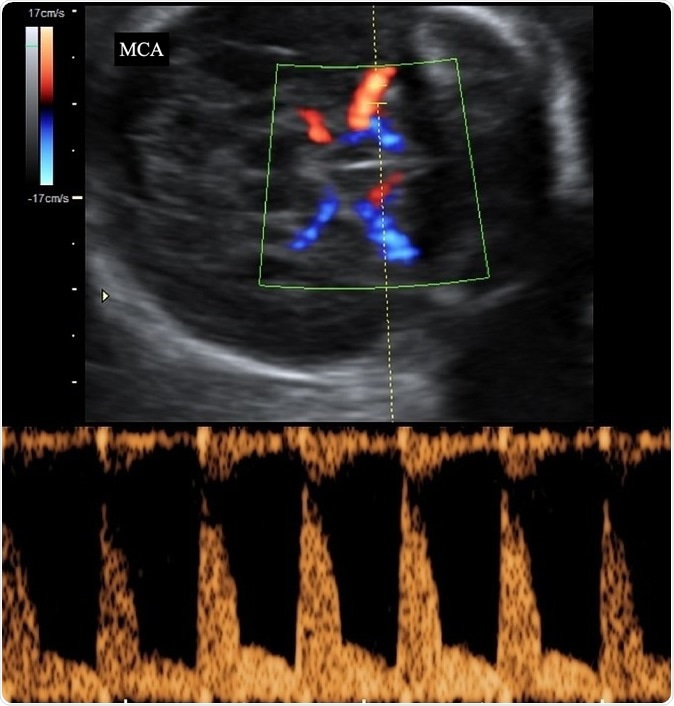The study, carried out by researchers at the Children’s National Hospital, cautions that more research will be necessary to confirm this conclusion. Nonetheless, the authors say that mothers needed to have screening for mental distress incorporated into their standard antenatal care routine, as well as getting the support they need if they are exposed to excessive stress, in order to prevent harm to the developing fetal brain.

Color Doppler Ultrasound of Fetal Brain (Middle Cerebral Arteries ) Many Other Radiological Images (CT, MRI, PET CT, X-ray) in my portfolio. Image Credit: Springsky / Shutterstock
The study
The most frequently seen fetal congenital anomaly is congenital heart disease (CHD). It refers to any of a host of structural defects in the heart. The study was based on screening pregnant women with babies who had been found to have a significant heart defect. In addition, the researchers found that pregnant women, in general, have a lot of psychological distress, in general. Mental issues are the most common pregnancy complications, found in over a fifth of women either before birth or in the first year following birth. However, when it comes to having a baby with a heart defect, almost double this number will have mental complications including severe stress.
The study included 48 women who had been told their fetuses had CHD, compared with 92 women who had normally developing pregnancies. The researchers used tested and standardized screening tools to screen these women for stress and anxiety. Evaluation using standardised tools, namely, the Perceived Stress Scale, Spielberger State-Trait Anxiety Inventory, and Edinburgh Postnatal Depression Scale, for stress, anxiety and depression, respectively, showed that a good number of these women had experienced severe stress.
The 140 fetuses were imaged by magnetic resonance imaging (MRI) between 21 and 40 weeks, for a total of 223 sessions. The total brain volume (TBV) was measured in cubic centimeters. In addition, certain parts of the brain such as the cerebrum, cerebellum, brain stem, and the hippocampi on both sides, were also measured for volume.
The findings
The scientists found, to their surprise, that the stressful mental state of pregnant women reflected on the intrauterine environment of the fetus. As a result, the brain showed impaired development in certain parts involved in normal learning, coordination, social development and behavioral learning.
The study showed that the presence of CHD was linked with stress, depression and anxiety in 65%, 29%, and 44% of pregnant women, respectively, compared with only 27%, 9% and 26% of mothers in the other group. The presence of stress and anxiety in the second trimester of pregnancy was associated with a reduction in hippocampal and cerebellar volume in those mothers whose babies had been diagnosed with CHD. This affected specific sites – the inner side of the head of the left hippocampus and the underside of the head and body of the right hippocampus and certain areas of the left lobe of the cerebellum.
Implications
The reduced growth in these regions is important because memory and learning are mediated in part by the hippocampus, while cerebellar function is crucial to motor coordination as well as being essential to proper social and behavioral development. The hippocampus is already known to be affected easily by stress. It is possible that the diagnosis of CHD could have happened at a time during pregnancy when the developing brain structures were especially susceptible to damage. During the third trimester, when the fetal cerebellum is the fastest-growing brain structure, the excessive stress could have had an impact on its growth.
The researchers noted that all women in both groups had no prior history of depression or anxiety, and none had been on medications. None had ever been to mental health professionals for therapy. Most of them were well educated, with over 80% being college-educated while 75% were professionals. This meant that they probably had access to adequate resources for such conditions as anxiety and depression.
Thus, the study shows that all pregnant women should be screened routinely for anxiety and stress, and appropriate measures need to be offered to combat these conditions during pregnancy. Stress during pregnancy is a toxic factor that impacts both the mother and fetal health. The researchers conclude, “We hope this becomes standard practice elsewhere.”
The study adds urgency to the task of identifying expectant mothers who are stressed out during pregnancy so that appropriate interventions can be performed to reverse this condition early in pregnancy.
Lead author Yao Wu says, “Our next goal is exploring effective prenatal cognitive behavioral interventions to reduce psychological distress felt by pregnant women and improve neurodevelopment in babies with CHD.”
Journal reference:
Association of maternal psychological distress with in utero brain development in fetuses with congenital heart disease. Yao Wu, Kushal Kapse, Marni Jacobs, Nickie Niforatos-Andescavage, Mary T. Donofrio, Anita Krishnan, Gilbert Vezina, David Wessel, Adré du Plessis, and Catherine Limperopoulos. JAMA Pediatrics, January 13, 2020. doi:10.1001/jamapediatrics.2019.5316, https://jamanetwork.com/journals/jamapediatrics/fullarticle/2758663